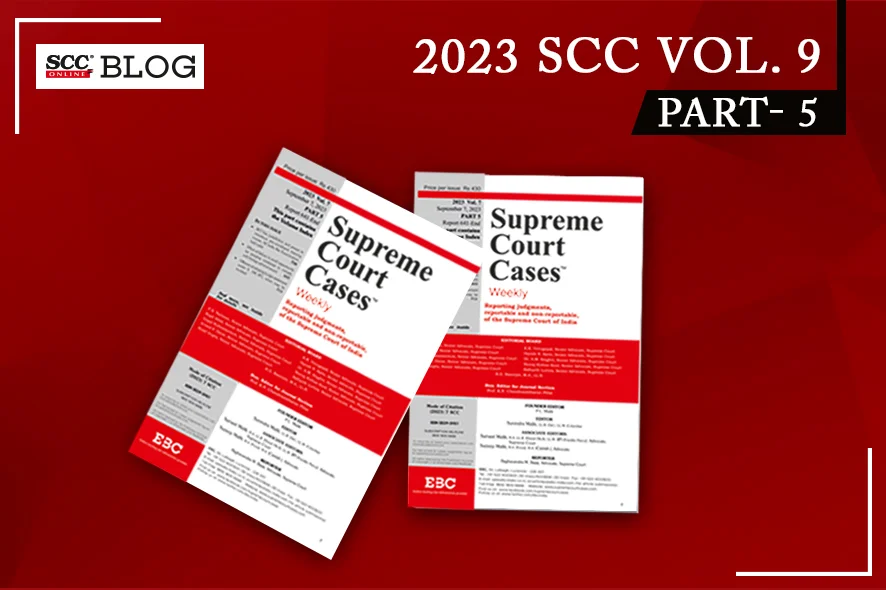Border Security Force Rules, 1969 — Rr. 142, 143, 43, 45, 48, 49, Appendices IV and VI: Strict adherence to procedural safeguards is necessary. [Union of India v. Jogeshwar Swain, (2023) 9 SCC 720]
Carriage by Road Act, 2007 — S. 16 (more or less in pari materia with S. 10 of the Carriers Act, 1865) — Requirement of notice in writing prior to institution of suit or legal proceedings: S. 16 is applicable only in respect of institution of a suit or legal proceeding against a common carrier for any loss of, or damage to, the consignment. Further, the word “consignment” in the said provision denotes that the suit and legal proceedings in connection with the loss or damage to the consignment alone are covered by it for which purpose, a notice is mandatory. [Essemm Logistics v. DARCL Logistics Ltd., (2023) 9 SCC 753]
Civil Procedure Code, 1908 — Or. 47 R. 1 & Expln. r/w Art. 137 of the Constitution and Or. XLVII R. 1 of Supreme Court Rules, 2013 — Review — Maintainability: Due to disagreement at the Bench on the issue of recalling of earlier decisions on basis of a subsequent decision, on a pure question of law when earlier decisions arrived at were on basis of law as it stood at the time, matter referred to larger Bench. [State (NCT of Delhi) v. K.L. Rathi Steels Ltd., (2023) 9 SCC 757]
Criminal Procedure Code, 1973 — S. 154 — Preliminary enquiry: Lalita Kumari, (2014) 2 SCC 1, para 120.7, providing for timeline within which preliminary enquiry is to be completed, modified. [Lalita Kumari v. State of U.P., (2023) 9 SCC 695]
Criminal Procedure Code, 1973 — Ss. 156(3), 154(3), 36, 200, 202 and 482: Law clarified relating to scope of powers of Magistrate under S. 156(3) and extent of discretion conferred on Magistrate by use of expression “may” in S. 156(3). [XYZ v. State of M.P., (2023) 9 SCC 705]
Education Law — Employment and Service Matters re Educational Institutions — Appointment/Recruitment — Illegal/Invalid Appointment — Non-payment of salary — Propriety: Once appointment of appellant was declared illegal/void ab initio and cancelled, appellant could not legally continue in service thereafter, unless cancellation was set aside. Hence, no claim for payment of salary could be made for any period. [Dulu Deka v. State of Assam, (2023) 9 SCC 749]
Family and Personal Laws — Family Property, Succession and Inheritance — Will — Validity — Requisites for: Since testator/testatrix, at time of testing document for its validity are not available for deposing as to circumstances in which will was executed, stringent requisites for proof thereof are statutorily enjoined to rule out possibility of manipulation. [Meena Pradhan v. Kamla Pradhan, (2023) 9 SCC 734]
Hindu Succession Act, 1956 — S. 6 — Rights of daughter and devolution of interest in coparcenary property: After decision in Vineeta Sharma, (2020) 9 SCC 1, allotment of due share in favour of daughter must be in accordance with law i.e. in equal share with any son(s). When law governing parties has been amended before conclusion of final decree proceedings, held, the same must be considered and appropriately applied by court. [Prasanta Kumar Sahoo v. Charulata Sahu, (2023) 9 SCC 641]
Income Tax — Charitable Purpose/Charitable Trust — Exemption in respect of income derived by trust managing a newspaper — Entitlement to: During the relevant assessment year, the assessee Society claimed exemption, inter alia, in respect of income from newspapers, which included advertisement revenue, to the extent of Rs 9,52,57,869 and surplus of Rs 2,16,50,901 from its activities. It was held, matter is to be re-examined in light of law as declared in Ahmedabad Urban Development Authority, (2023) 4 SCC 561. [CIT v. Servants of People Society, (2023) 9 SCC 697]
Juvenile Justice (Care and Protection of Children) Act, 2000 — Ss. 2(k), 7-A(1) and 16 r/w S. 15(1)(g) — Claim of juvenility: Claim of juvenility can be raised at any stage. Principles reiterated relating to relevant stage at which it may be raised, and consequential orders that may be passed. [Makkella Nagaiah v. State of A.P., (2023) 9 SCC 807]
Penal Code, 1860 — S. 302 — Imposition of life imprisonment with a fixed minimum non-remittable term: A power which can be derived from IPC to impose a fixed-term sentence or modified punishment can only be exercised by High Court or in the event of any further appeal, by Supreme Court and not by any other court. Further held, power to impose a modified punishment of providing any specific term of incarceration or till the end of convict’s life as an alternative to death penalty, can be exercised only by High Court and Supreme Court and not by any other inferior court. [Shiva Kumar v. State of Karnataka, (2023) 9 SCC 817]
Penal Code, 1860 — S. 307 — Sentence: Reduction of sentence, by considering long pendency of matter, old enmity between parties, absence of premeditated assault on part of appellant having no criminal antecedents. [Pramod Kumar Mishra v. State of U.P., (2023) 9 SCC 810]
Penal Code, 1860 — Ss. 302 and 307 — Death sentence or life imprisonment: As incident occurred nearly 28 yrs ago, awarding death sentence, held, not appropriate and, thus, the accused sentenced to imprisonment for life under S. 302 along with fine of Rs 20 lakhs. [Harendra Rai v. State of Bihar, (2023) 9 SCC 702]
Penal Code, 1860 — Ss. 84 and 302 — Defence of insanity or unsoundness of mind: Matters to be established to claim benefit of defence of insanity or unsoundness of mind, illustrated. [Rupesh Manger v. State of Sikkim, (2023) 9 SCC 739]






